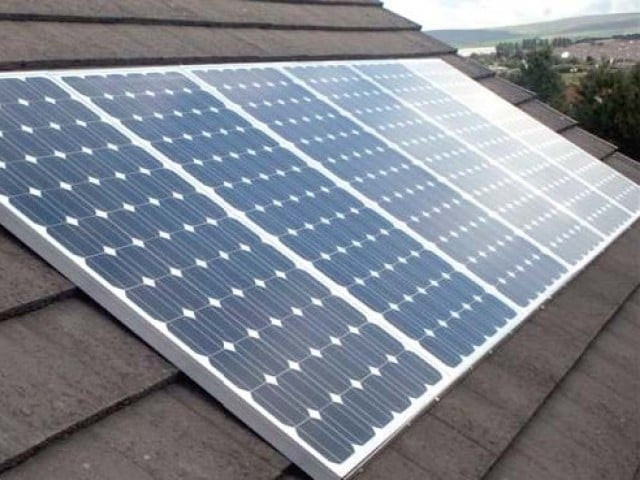Powered by nature: Experts discuss feasibility of solar energy for shops
Majority of shopkeepers say they would switch to solar energy.

Powered by nature: Experts discuss feasibility of solar energy for shops
About 90 per cent of shopkeepers surveyed in Urdu Bazaar said they will opt for some form of solar energy, but are reluctant to do so because of a lack of confidence in the government, Karachi Electric Supply Company (KESC) and other companies offering solar technology.
The survey was conducted as part of a paper titled “Study into the Acceptability of Alternative Energy Sources for Urdu Bazaar in Karachi”. The authors of the paper, renowned architect and chairman of the Urban Resource Centre, Arif Hasan, and Mansoor Raza, talked about their findings at a presentation organised on Wednesday.
They said that the shopkeepers feel that the government will impose a ‘solar tax’ if the usage of solar energy becomes widespread and that successive regimes would keep changing policies, leading to inconvenience. Many of them also if the solar companies subsequently vanish, they would be stranded with expensive equipment that cannot be used.
Solar energy has traditionally been considered - and actually was – an expensive form of renewable energy. But in recent times, the sales tax and duty for solar panels has been removed, leaving only income tax. This has reduced the price of solar energy by at least 20 per cent, said Hasan. “The use of solar energy for pumping water would help solve huge problems that the municipal authorities are facing,” he said. “Sometimes there is no electricity and everything stops for about five or six hours. This will not occur if solar energy is used.”
Hasan said that the survey was conducted as people have proposed the use of solar energy for homes and municipal authorities, but little has been done to find out how it can be utilised in markets. Nobody has even asked shopkeepers how they feel about it, he added.
“Generators are causing health problems for shopkeepers. They complain of headaches and breathing problems,” said, Mansoor Raza.“It also affects their businesses because generators are so noisy that people avoid stores which use them. It also becomes impossible for shopkeepers to talk to each other, hear customers or speak on the telephone,” he added.
Out of the 100 shopkeepers surveyed, the highest energy consumption reported was 250 watts. This includes one telephone charging point, four energy saver light bulbs and two fans. The cost of using solar panels to generate this energy would be around Rs115,000. Four panels would be utilised and a 10 by 12 inch space would be required. This package includes energy storage capacity as well as invertors. Without these items, the cost will drop down to about Rs64,000.
The capital costs of solar energy are higher than using a UPS, generator or the services of the KESC. However, the running costs are a lot lower for solar energy and the life of the equipment is also longer than a generator or a UPS. For instance, on average, the capital cost of a generator is Rs37,500 and the running costs are about Rs5,882. It also last for about 7.5 years. On the other hand, solar panels, (with storage capacity) cost about Rs78,000 and have a running cost of Rs608. These will last for about 20 years. If the KESC’s services are used, the average billing minimum is Rs1,800 a month with zero capital costs or equipment depreciation issues.
There are four packages, ranging from 50 watts to 250 watts, which the authors have developed for the owners of stores. About 50 per cent of the surveyed shopkeepers said they would switch to solar energy because it is economical, fourteen per cent said they would do so because it is durable and sixteen per cent felt it would provide them relief from power cuts.
Technical issues that have to be taken into account include the weather pattern of an area where solar panels are installed and the loss of power if energy is being transmitted to the ground floors from the roof of a tall building. Shopkeepers will have to come up with ways to share the energy as they have already split the costs incurred by the use of generators.
Published in The Express Tribune, May 31st, 2012.



















COMMENTS
Comments are moderated and generally will be posted if they are on-topic and not abusive.
For more information, please see our Comments FAQ